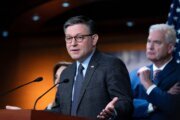WASHINGTON — During his monthly appearance on WTOP’s Ask the Governor program, Virginia Gov. Ralph Northam suggested that proposed changes to the Metro funding bill might include tax hikes that the General Assembly had stripped from the bill.
A compromise between the Senate and House of Delegates found Virginia’s $154 million share of the money needed to fund Metro. Maryland and D.C. have come through with their shares. A number of Northern Virginia leaders have objected to the state’s plan, saying it takes money from other transportation projects such as roads.
“We have a plan on the table that does take funding from the (Northern Virginia) Transportation Authority,” Northam said; area leaders have concerns, “as do I.”
Northam said the choice was “not an either/or,” and that proposed changes to the funding plan could include restoring hotel taxes and recordation taxes to the level originally passed as part of a transportation plan in 2013.
Then-Gov. Bob McDonnell amended that plan to reduce those taxes, and the legislature passed those changes. During the current negotiations, some business leaders and local governments have suggested reimposing some of those taxes at their originally levels. The idea was in the Senate version of the current bill, but was taken out in the process of negotiations with the House, led by Rep. Tim Hugo.
The General Assembly meets in special session April 11, and meets to consider amendments beginning April 18. Northam added that no matter what comes out of the reconvening, Virginia’s funding of Metro will come through: “It’s not only important to the economy of Northern Virginia; it’s important to the economy of Virginia.”
Budget showdown
Northam also spoke about the budget impasse that has made next month’s special session necessary.
The governor hoped that the new budget would include the Medicaid expansion that was passed in the House of Delegates but has stalled in the Senate, both of which are controlled by Republicans. There’s about a $400 million difference between the two versions. The budget failed by only two votes in the Senate.
In negotiations, Northam said, “I’ve just tried to emphasize … the importance of individuals having access to health care,” saying that Medicaid expansion would bring $5 million a day in federal resources to the state in various forms.
“Any business that says it’s a good idea to give their competitors $5 million a day, as a neurologist I’d say they need their heads examined,” Northam said.
“We need a budget,” the governor added. “The House has stepped up to the plate … Now we just need to encourage the Senate to come on board with our plan.”
The state government would shut down July 1 if no deal were reached.
Golf course taxes
Northam said he would “take action” if a compromise couldn’t be worked out over a tax code adjustment for two Arlington County golf courses.
The bill would require the Army Navy Country Club and the Washington Golf and Country Club to be classified as “devoted to open space,” whereas they’re both currently classified as having “development potential.” The Arlington County Board has asked Northam to veto the bill, saying it would cost them $1.43 million a year in tax revenue and would set “a dangerous precedent for real property tax assessment decisions to be made in Richmond instead of at the local level.”
Northam echoed those concerns, saying that “I have a lot of concerns when the state gets involved at the local level.”
The bill’s sponsor, Del. Hugo, said the code as it’s written is unfair to the two courses, which pay much more in taxes than nearby courses combined, and also cited the large number of veterans who use the Army-Navy course. Northam said the veterans were “why this needs to be addressed,” and said “we’re having discussions” in Richmond.
If those negotiations aren’t fruitful, he said, “I will step in and take action.” He wouldn’t say explicitly whether he would veto the bill, or offer an amendment that would delay the date it became effective.
Guns
Northam said he attended last Saturday’s student-led March For Our Lives, which drew hundreds of thousands of people to the National Mall. He also met with students from Parkland, Florida, as well as some of the doctors who treated wounded high schoolers.
Echoing the slogan of the student activists, he said, “We as a society need to stand up and say ‘Enough is enough.’ … I would just invite anyone out there who doesn’t believe in responsible gun ownership to talk to some of these students, to talk to their families, and get a feel for what they’ve been going through.”
Northam is a professor at the Eastern Virginia Medical School; his wife is a K-5 teacher. “We’re not educators to enforce the law,” he said. “I would never want to encourage teachers being armed; I think that’s a terrible idea.”
“We want our schools to be safe,” he added, touting the threat assessment program in Virginia and saying, “We want to make sure we fund our school resource officers.”
But he added, “We need to talk about common-sense gun reforms.” He said he introduced several pieces of legislation, including a ban on bump stocks, promoting universal background checks and banning what he called “weapons of war.” Every one of his bills “was defeated the first morning that I took office — even before I’d given my first State of the Commonwealth Address.”
He said concerned residents should “reach out to legislators and demand that they do something.”
Northam added that he was still having discussions with legislators of both parties, and wouldn’t rule out another gun-control bill in the special session.
Medical marijuana
Northam recently signed a bill enabling Virginia doctors to recommend cannabis oil to treat any medically diagnosed condition, widening access from previous law which limited such recommendations to those with certain forms of epilepsy.
The legislature has been famously resistant to expanding marijuana access, Northam said, but activism has changed that. It started with parents of children with such conditions, and Northam, said he, as a doctor, was part of the effort.
He talked up the idea of decriminalizing marijuana, which he said “didn’t happen” in this legislative session.
“There are a lot of lives that are ruined by making mistakes” regarding pot, Northam said, including racial inequities regarding arrests and convictions.
Northam said he’d try again in the next session. “That’s something I ran on in 2017,” he said.
He’s also looking for the federal government to change the classification of marijuana, which would allow further study of its medical uses for many conditions.
Because it’s a Schedule 1 drug (meaning it’s said to have a high potential for abuse and no medical use)“we’ve been unable to study it and get the data that we need.” Changing the schedule would “open it up to a lot of other uses.”
Opioids
Northam said that preventing addiction, and treated those who are addicted, was the key to solving Virginia’s opioid crisis. Asked whether he supports President Donald Trump’s plan “Absolutely not, and it’s just more of his rhetoric. … We want to be tough on crime, but just talking about imposing the death penalty is not gonna solve our opioid crisis.”
He said one thing the federal government could do to help would be to crack down on interstate “doctor-shopping,” where people get prescriptions from many doctors. Southwestern Virginia borders four states. More resources for mental health agencies, as well as expanding access to health care, would also make a difference: “Any help that the federal government can give us would be greatly appreciated.”
Training for providers, and limits on the amount of opioids doctors can prescribe, is “very important,” Northam said. If someone is genetically predisposed to addiction, “we know that after five or six days of exposure to a narcotic, it’s too late.”
Amazon, pedestrians, basketball and more
Addressing other topics, Northam said that workforce development would be the key to attracting large businesses, including Amazon, to Virginia, as well as cutting down recidivism in Virginia’s prisons; he also reiterated his endorsement of fellow Democrat Jennifer Wexton in her challenge to congresswoman Barbara Comstock and said “I think we have a great chance to pick up that seat.”
He approved of a listener’s suggestion that universities get involved in studying ways to reduce road and highway fatalities, particularly among pedestrians and bicyclists, and commiserated with co-host Mark Lewis over the underwhelming performance of Virginia’s teams in the NCAA tournament.
He added that he won his bet with North Carolina Gov. Roy Cooper over the results of the ACC Tournament, but hadn’t received the six-pack of local craft beer that was supposed to be the prize. “I haven’t seen it come into Richmond. Maybe it’s in the mail, as they say. Any day now.”
Hear Gov. Ralph Northam’s full appearance on Ask the Governor, edited to remove traffic, weather and commercials:








